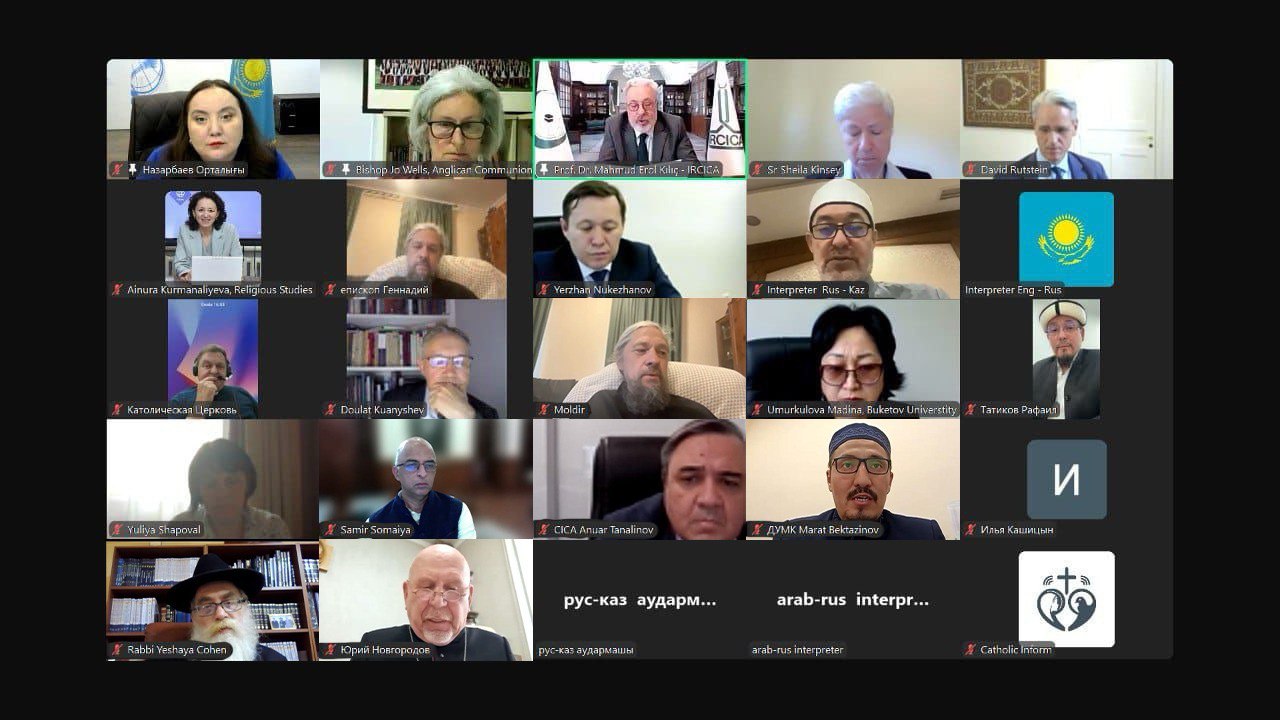On May 22, 2024, the N.Nazarbayev Center for Development of Interfaith and Intercivilization Dialogue organized an international online conference on the topic: «The Role of Religious Leaders in Achieving Sustainable Development of the World».
The event was attended by the Chairman of the Religious Affairs Committee of the Ministry of Culture and Information of the Republic of Kazakhstan Y.Nukezhanov, Acting Chairman of the Board of the N.Nazarbayev Center D.Yessenova, Head of the Department of International Relations and Protocol of SAMK M.Bektazinov, expert in the Military and Political Dimension of CICA D.Kuanyshev, Director General of the Center for the Study of Islamic History, Art and Culture at the OIC (IRCICA) Mahmud Erol Kılıç, Secretary General of the Bahai International Community David Rutstein, Rector of "Somaiya Vidyavihar" University Samir Shantilal Somaiya and other religious leaders, representatives of government agencies of Kazakhstan, international organizations, scientific and expert community of India, Turkey, Egypt, Pakistan, UK, Russia, Israel, Vatican.

During the conference, the participants discussed key aspects of expanding the participation of religious leaders in strengthening intercivilizational and interreligious dialogue, achieving their long-term stability, and preventing international conflict, as well as exchanged views on the implementation of the «2023-2033 Development Concept of the Congress of the Leaders of World and Traditional Religions», adopted at the XXI meeting of the Secretariat of the Congress.
«The role of religious leaders and religious diplomacy is important for dialogue with world political leaders, international organizations and religious communities. The direct joint appeal of the world's leading religious leaders to international aggressors can already reduce international tensions or increase the likelihood of its de-escalation since the political status of religious leaders is neutral», - noted in his welcoming speech Y.Nukezhanov.
In turn, M.Bektazinov emphasized that «thanks to the unity and friendship Kazakhstan has become a prestigious country in the world. Peace and harmony, harmony of cultures and religions in the multinational country are recognized as a world standard. Kazakhstan is considered the world center of interconfessional dialogue».
Prof. Mahmud Erol Kılıç made a speech in continuation of the conference, noting that «the Declaration adopted at the VII Congress of Leaders of World and Traditional Religions in 2022 provides a fruitful consultative framework in the meeting places of religions. The document emphasizes the role of religions and their leaders in building a just and peaceful future for humanity».
In his speech, David Rutstein drew the attention of participants to the fact that «such far-reaching changes will only come about by addressing the intangible dimension of reality and tapping into the vast spiritual resources of humanity. Religious leaders can help accelerate this process with their words and actions».
«For people with a big heart, the whole world is a family. In the case of climate change, we must realize that we have no choice but to see the world as our family. We can't even afford to be narrow-minded. Thinking about ourselves means thinking about the world as well. We must take inspiration from scriptures, learn from science, face the truth and act», - said Samir Shantilal Somaiya.
Summarizing the speeches of the participants, the moderator of the conference D.Yessenova expressed gratitude to the participants of the conference for comprehensive and consistent support of the initiative to hold the Congress of Leaders of World and Traditional Religions, as well as emphasized the role of religious leaders in achieving sustainable development of the world and further expansion of partnership in promoting interreligious dialogue, as well as its Declaration and the Concept of Development of the Congress.
In general, following the results of the international online conference, the experts emphasized the importance of international initiatives of the countries in the development of the global dialoge of the world and traditional religions, as well as reached an agreement on further fruitful cooperation on strengthening interreligious dialoge.


















